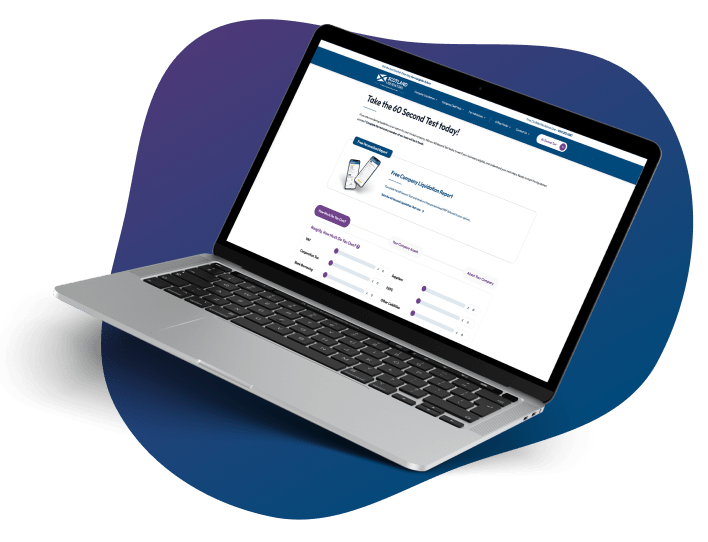Scotland Liquidators Glenrothes
Operating extensively throughout Scotland, including in the region of Glenrothes, Scotland Liquidators are dedicated to supporting company directors with expert insolvency and liquidation advice.
Our team of licensed insolvency practitioners can guide directors through the available liquidation options for their limited companies in Glenrothes. Whether your company is solvent or insolvent, we have the expertise to assist.
For directors looking to wind down a solvent company, we can offer assistance through a Members’ Voluntary Liquidation (MVL), recognised as a tax-efficient method of company closure. Alternatively, our team can facilitate a Creditors’ Voluntary Liquidation if your business is insolvent and unlikely to be rescued through restructuring procedures.
Suggested Pages:
Creditor’s Voluntary Liquidation in Glenrothes
In cases of insolvency, it is crucial to act swiftly. Our team can help initiate a Creditors’ Voluntary Liquidation (CVL), bringing a formal end to the company and prioritising creditors’ repayments. Delaying action could lead to compulsory liquidation through a winding-up order by order of the courts.
To explore the best liquidation options for your company in Glenrothes or other regions, contact our team today for a free initial consultation with our licensed insolvency practitioners across Scotland. We provide personalised advice tailored to your company’s financial circumstances, ensuring you make informed decisions about its future. Contact our expert team operating in Glenrothes today for more details and guidance.
Closing a Scottish limited company with HMRC debts
If your limited company is no longer financially viable and you have tax debts you cannot pay, closing it down can be an effective way to escape the financial pressure so you can move on to something new.
As soon as you become aware your company is insolvent, you should cease trading and seek professional advice from an Insolvency Practitioner. Your legal duties as a director now switch from promoting the success of the company to acting in the best interests of your creditors (parties you owe money to). By ceasing trading, it prevents the company from building up further debts it cannot pay that you could be made personally liable for.
Once you have ceased trading, you can voluntarily enter the company into a formal insolvency procedure called a Creditors’ Voluntary Liquidation (CVL). You must appoint an Insolvency Practitioner (IP) to act as the liquidator. They will take control of the company, invite claims from your creditors and sell off the company’s assets to raise money to repay HMRC and any other creditors.
The liquidator will repay your creditors in a strict order. As long as you have acted according to the insolvency rules, any debts the company cannot pay in full, including the company’s tax debts, will be written off. You’ll only have personal liability issues if you have signed a personal guarantee to secure company borrowing.
Why you need to act quickly with HMRC debts
Owing money to HMRC is not unusual. Most businesses in financial distress will have some form of tax debt. As the most common creditor in the UK, HMRC has strong powers of debt enforcement and will act quickly to recover its money and prevent you from accruing further tax liabilities you cannot pay.
It might be possible to negotiate a Time to Pay arrangement with HMRC, which will give you more time to pay what you owe. However, if your business is no longer financially viable, it’s in everyone’s best interests to close it down.
If you do not enter the company into liquidation voluntarily, HMRC can issue a Winding Up Petition to force the business into Compulsory Liquidation. As part of the process, the liquidator will investigate the reasons for the insolvency and the directors’ actions. That increases the likelihood that you will receive a penalty, such as being made personally liable for company debts or being handed a directorship ban.
Can I dissolve a company with tax debts in Scotland?
You might have heard of Company Dissolution or Strike Off as a way of closing your company. However, only solvent businesses can use this process. To dissolve your company, you would have to contact HMRC to settle your tax debts and repay all your other creditors in full. Only then could you apply to Companies House to strike your business off the official register.
If you try to dissolve a company without paying your tax debts, HMRC will formally object to your application. You could also face serious reprisals from the Insolvency Service, as it will be noted that you tried to use the strike-off process to avoid paying your debts.
Why close a company with HMRC debts via a Creditors’ Voluntary Liquidation?
If you want to close your limited company and have tax debts you cannot pay, you have two options. You can:
- put the company into liquidation voluntarily via a Creditors’ Voluntary Liquidation (CVL); or
- wait for HMRC or another creditor to force you into Compulsory Liquidation.
There are several benefits associated with taking control of the situation by initiating a CVL:
- You can decide when you enter liquidation and appoint your choice of liquidator.
- The liquidator will still scrutinise your conduct, but there’s less risk that director misconduct allegations will be made against you.
- If you have worked as an employee of the company for a minimum of 16 hours a week for at least two years, you could be eligible for company director redundancy pay.
If you’re unsure of your next steps or want to know more about how to close a limited company with HMRC debts, please contact the team at Scotland Liquidators. We offer free same-day consultations and provide expert guidance and support throughout the process.
I knew I needed to close my company but I wasn’t sure how to go about this with large debts that I was unable to repay. Scotland Liquidators clearly explained my options and held my hand throughout the entire process.
Catherine Muller | Director
I would highly recommend Scotland Liquidators to anyone considering closing their business. From the first phone call I knew where I stood and what my options were. I cannot thank them enough.
Jonathan Booth | Director
Scotland Liquidators helped me close my company last year after I made the tough decision to stop trading. My advisor was patient, knowledgeable, and supportive from start to finish. Many thanks.



